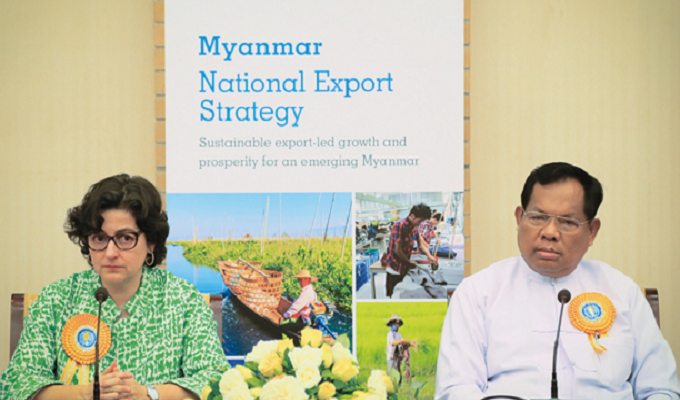

Trade-led growth in Myanmar: from strategy to implementation
Aiming for trade-led growth is easier than achieving it. Policymakers face difficult choices: what to do; where to start; how to prioritize; and why. To help them answer these questions, ITC works with interested governments to develop a National Export Strategy (NES). This document delivers a roadmap identifying sectors and specific, costed reforms and development projects that would deliver high returns on investment in terms of growth, job creation, and trade performance. But simply having a strategy does not automatically translate into an improved presence on the world trade map: strategies need to be implemented.
In Myanmar, a NES was launched in March 2015, following a far-reaching consultative process involving multiple ministries, business associations, and development partners. It outlined concrete, market-based solutions to the country’s competitiveness constraints, detailing specific activities, timelines and impact measures for what different market actors needed to do. At the time, U Win Aung, president of the Union of Myanmar Federation of Chambers of Commerce and Industry (UMFCCI), said ‘the NES has laid the foundation for public-private partnership in enhancing, diversifying and developing Myanmar’s export trade,’ both in agro-industry and manufacturing.
While the NES was an important first step, achieving its vision of ‘Sustainable export-led growth, leading to prosperity for an emerging Myanmar’ will rely on effective implementation. For a country in economic and political transformation, such a transition is even more challenging as implementation often takes place ad hoc in the absence of an efficient management structure.
The responseResource-efficient NES implementation demands coordination among a host of public and private stakeholders. ITC worked with the Myanmar government to set up the NES Implementation Management Support project to help ensure the country and its SMEs harvest the gains from greater trade integration.
The project empowers the Ministry of Commerce and key stakeholders to establish public-private mechanisms for implementing NES objectives and coordinating other traderelated initiatives. These mechanisms foster greater transparency and better communication among the public and private sectors as well as with development partners. Crucially, they enable better decision-making and more efficient aid planning. The project is fully aligned to existing national development frameworks such as the Nay Pyi Taw Accord for Effective Development Cooperation.
The project also enables state-of-the-art online tracking of trade development projects across the country through a Strategy Implementation Management Tool (SIMT), which acts as a single window for the government and its partners to collect and manage project data. In Myanmar, SIMT builds and expands on data from the national aid data management system, Mohinga. SIMT users are able to generate customized reports on specific sectors; NES-wide implementation reports are shared with the Trade Sector Working Group, one of the public-private mechanisms involving national stakeholders and development partners, to facilitate joint planning.
The resultsThe NES management project system identified 75 projects funded by the national budget, development partners or private investors that were in line with (and in some cases inspired by) the agenda set out in Myanmar’s NES. By systematically mapping and tracking these projects,
the NES Implementation Management Support framework has created greater transparency among ministries, the private sector and development partners, enabling them to maximize efficiency and minimize duplication in resource allocation. Public and private stakeholders are fully involved in planning and coordination, thus building national ownership of Aid for Trade projects.
To explore one example of how this has worked in practice, a key trade development priority for Myanmar is to rapidly improve quality assurance systems so that high-potential sectors, such as oilseeds, can comply with international health and safety standards. Compliance with international market requirements is a critical step to revitalizing the industry: it would assure domestic and foreign consumers about product safety, enabling producers to better compete with palm oil imports and take advantage of the recent export trade opening. This would contribute to better livelihoods and incomes for farmers and oilseed collectors in the Mandalay, Sagang and Magway regions, as well as for processors and exporters across the country.
The NES management coordination mechanisms enable actors to specialize and avoid duplication. For instance, the ITC project on ‘Food Safety and Compliance with Sanitary and Phytosanitary Measures in the Oilseeds Value Chain’ focuses directly on improving value chain performance by aligning product quality to market requirements (including international food safety standards) and linking exporters to foreign buyers. Meanwhile, other development partners, such as PTB, Germany’s national metrology institute, and GIZ, the German corporation for international cooperation, and the United Nations Industrial Development Organization (UNIDO) specialize in building the national quality assurance infrastructure and facilitating access to equipment.
By fostering complementarity across a diverse array of partners, the NES Implementation Management Support Project lets different actors join efforts to close gaps, maximizing the impact for Myanmar’s oilseeds sector, which used to be among the world’s leaders.
‘The NES and its implementation framework are providing a solid mechanism to coordinate trade development in Myanmar,’ said U Aung Soe, NES Navigator and Deputy Director General, Department of Trade Promotion and Consumer Affairs, in Myanmar’s Ministry of Commerce. ’It is leading to increased collaboration between the public and the private sector, as well as with development partners.’
The futureITC’s NES Implementation Management Support to Myanmar will continue to provide support to effective project implementation and resource mobilization in line with domestic priorities. It could also serve as a model for developing similar coherence-promoting support to trade development work in other countries.



